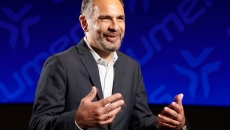Artificial Intelligence
Industry-defined limitations can help ensure an accelerated path to adoption by protecting providers from algorithm failures that could cause counter-evolutionary overreactions to artificial intelligence usage, says one CTO.
Digital tools are improving the clinician experience in Seoul, say Dr. Wonchul Cha, CMIO and director of the Digital Innovation Center at Samsung Medical Center, and Dr. Meong Hi Son, vice director of its Digital Transformation Center.
The new offering could help healthcare customers build, deploy and manage customized Azure-based artificial intelligence applications for large language models using more than 100 NVIDIA AI frameworks and tools.
There are ways technology can help ease clinician burden. Kathleen McGrow, chief nursing information officer at Microsoft and a 2023 HIMSS Changemaker Award recipient, explains how.
While the World Health Organization says it's "enthusiastic about the appropriate use" of large language models such as ChatGPT, it has deep concerns about artificial intelligence being used in "safe, effective, and ethical ways."
The HIMSS Electronic Health Record Association says it has substantial concerns with regulatory deadlines and other stipulations in ONC's proposed interoperability and AI transparency rule.
Also, Southeast Asian hospital chain HMI Group has bought health tech company MHC.
Also, Dr Marco Briceno has been officially appointed as CEO of NT Health.
"We're aiming to cut through the buzz around AI in healthcare to prove the promise and positive impact of this exciting technology for improving patient outcomes."
In two years following 100 new-start opioid use disorder patients, Bill Farr says 94% remained in the medication-assisted treatment program – attrition rates had previously hovered around 54%.









